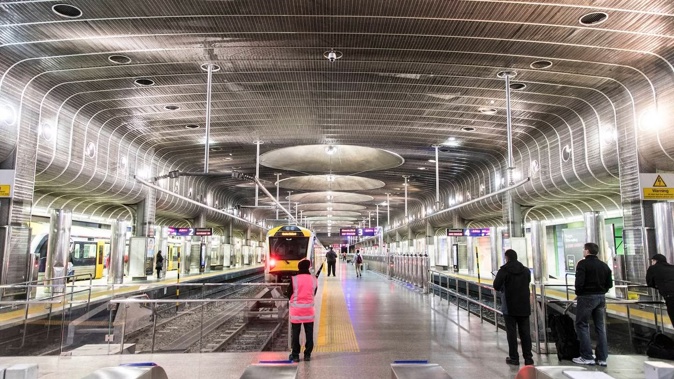
Seven Auckland railway stations are getting new names, including the city’s busiest train station, Britomart.
Anselm Haanen, Ngā Pou Taunaha o Aotearoa New Zealand Geographic chairperson, said six of the seven railway stations - two in South Auckland and four in central Auckland - were gifts from mana whenua.
The seventh railway station, Drury in South Auckland, recognises the place being serviced by the new station.
“The new names will help connect the railway stations to the local history of the areas they serve,” he said.
“The use of these new names will also help to re-establish cultural connection and identity when used by the public.”
The concepts for the railway station names were conceived by KiwiRail, City Rail Link Ltd, and Auckland Transport and went through a public consultation process.
Three of the new stations will be built between Papakura and Pukekohe, south of Auckland.
They are Drury Railway Station, Ngākōroa Railway Station, and Paerātā Railway Station, respectively.
Drury Train Station will serve the township of Drury, which was given its name in honour of Commander Byron Drury of the survey ship HMS Pandora.
Ngākōroa Train Station, which will serve the rapidly expanding residential region nearby, is named after a nearby stream of cultural importance.
The Paerātā Railway Station will be close to the Paerātā Rise development and the Paerātā community.
The other four stations are located in central Auckland on the new City Rail Link line.
They are officially named Karanga-a-Hape Railway Station, Te Waihorotiu Railway Station, Maungawhau Railway Station (formerly Mount Eden) and Waitematā Railway Station (formerly Britomart Station).
The brand-new Karanga-a-Hape Train Station has entrances on both sides of Karangahape Rd. Its story relates to the call of Hape, a Tainui ancestor, near its location.
Maungawhau Railway Station is the new name for Mount Eden station, named after its proximity to the nearby maunga (mountain) and its whau (trees).
Another brand-new station, Te Waihorotiu Railway Station, is close to SkyCity and Aotea Square and is expected to become one of the busiest in the nation. The name relates to a taniwha in the waters and is derived from a historic stream that previously flowed into Waitemata Harbour.
To recognise its proximity to Waitematā Harbour and its connection to it, as well as the transportation options there, Britomart Station has been renamed Waitematā Railway Station.
The harbour’s flat, clear waters are referred to as Waitematā because they resemble matā (obsidian).
A Te Arawa ancestor is said to have visited the port and left an obsidian stone as a talisman in the northern part of the harbour, according to another legend. The shopping district and Britomart Place continue to go by the name Britomart.
Mana Whenua Forum spokesperson Kingi Makoare, Ngāti Whātua Ōrākei, welcomed the news that Te Reo Māori names would be adopted for the new and existing stations.
“We as mana whenua iwi have drawn on our intergenerational wisdom in gifting these names which give meaning and purpose to our lives moving forward while reminding us of who we are as people,” Makoare said.
“Whatungarongaro te tangata toitū te whenua – as man disappears from sight the land remains.
“This demonstrates the holistic values of te ao Māori and the utmost respect of Papatūānuku, the mother of the earth. People will come and go but the land will remain.”
Pāora Puru, Ngāti Te Ata Waiohua, said the names give the communities within Tāmaki Makaurau a chance to share and celebrate the city’s rich history.
“It’s about reinstating the traditional names of the area – looking back to a time before concrete and skyscrapers - when people lived off the land. They reflect the mythology, atua, people and aspects of early life indigenous to the landscapes,” he said.
The project’s strong ties to history and storytelling are celebrated by the stations’ naming, according to CRL Ltd chief executive Dr Sean Sweeney, and it also more correctly reflects the stations’ geographic positions.
“The names and station designs are a unique expression of a cultural narrative for both the people and the city that hasn’t been seen anywhere else in the world, evocative of both people and place,” Sweeney said.
“The City Rail Link is designed to carry Aucklanders forward into a world-class rail-driven future but it is important to anchor our efforts to the past and the history of the people who have lived here.”
Take your Radio, Podcasts and Music with you









